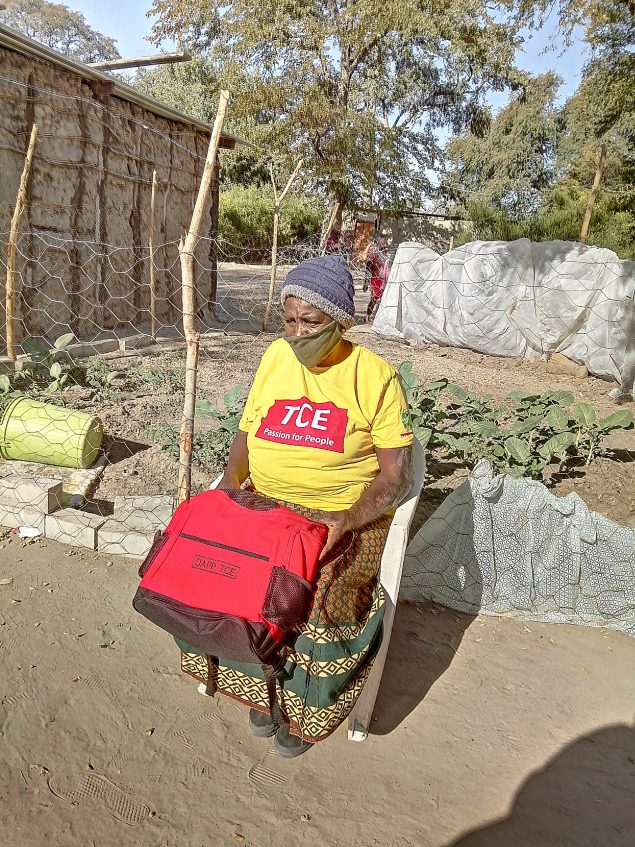Collecting four months of medicine: Stepping up HIV patient care during a global pandemic
The Ministry of Health and Social Services (MoHSS) currently provides people with HIV with enough medicine that they can take every day for four months. Before the COVID-19 pandemic, patients collected medicine each month. Providing medicine for one-third of the year is particularly helpful for people who live far away from a clinic, saving them money and time because they do not have to visit the clinic so often. Providing patients with four months of medicine is also helpful for patients who live close to their local clinic but who otherwise have to take time off work to visit the clinic, or who cannot easily visit the clinic for reasons such as childcare, household responsibilities, or other barriers that make visiting the clinic a challenge.
The U.S. Centers for Disease Control and Prevention country office in Namibia (CDC Namibia) and partners are supporting the MoHSS to help more people with HIV receive four-month daily-medicine packages. This process has included making sure that there is enough medicine in the country; updating the treatment guidelines to specify how multi-month dispensing, as it is technically termed, should be achieved; and training healthcare providers on how to implement the process.
Following the onset of the global COVID-19 pandemic, the value of four-month medicine packages in keeping patients away from clinics has become even more important. It has helped healthcare providers spend less time seeing healthy patients and more time preparing to respond to COVID-19 cases – including completing online trainings and updating clinic procedures in line with new regulations for infection prevention and control.

A community member attends a community adherence group supported by Development Aid from People to People
Reducing number of people visiting clinics through community adherence groups
One of the partners funded by CDC Namibia through the President’s Emergency Plan Fund for Aids Relief (PEPFAR) to help people with HIV access four-month medicine packages is Development Aid from People to People, or DAPP as the organization is better known. One of the ways DAPP does this is through support of Community Adherence Groups, or CAGs. Community Adherence Groups are groups of 6-12 HIV-positive patients who have their virus under control and who meet on a regular basis in their community to receive their medicine. The group chooses a member to visit their local clinic to collect the medicine for all the group members. When they meet, they also receive counselling and support from DAPP staff on how to keep taking medicine and stay healthy.
“Because it is so important right now to reduce the number of people visiting clinics, we are working harder than ever to establish community adherence groups, and within those groups, to ensure that patients receive four-month medicine packages,” explained Kirsten Moeller Jensen, Country Director for DAPP.
Between March-April 2020, the number of patients supported by DAPP who received four-month medicine packages more than doubled from around 500 to over 1,200 patients. According to one of the leaders of a community adherence group, “Now I can do my work any time, I do not go to the clinic every month. In the club we help each other, and the members support me.”
Providing people with HIV with enough medicine to last them up to six months has always been part of the planning process for Namibia to make long-term HIV care more convenient for patients. Due to the COVID-19 pandemic, the implementation of this process has been rapidly accelerated to benefit more patients in a shorter than planned period of time, starting with the four-month packages. This has been achieved through the dedication and hard work of the MoHSS and DAPP staff.
I am so impressed by the hard work of the healthcare workers who have started community adherence groups and supported patients to receive four-month medicine packages. This has given facilities more time to prepare for COVID-19 cases and it is just one of the small steps that has helped Namibia to be in a stronger position to deal with COVID. Importantly, it will have long-term benefits for HIV-positive patients and clinics beyond the challenges we are currently experiencing with the COVID-19 outbreak.
“I am so impressed by the hard work of the healthcare workers who have started community adherence groups and supported patients to receive four-month medicine packages. This has given facilities more time to prepare for COVID-19 cases and it is just one of the small steps that has helped Namibia to be in a stronger position to deal with COVID. Importantly, it will have long-term benefits for HIV-positive patients and clinics beyond the challenges we are currently experiencing with the COVID-19 outbreak,” said CDC Namibia Country Director, Dr. Eric Dziuban.
“This is a great example of how existing programs have been accelerated during the COVID-19 pandemic to strengthen the healthcare system response to the outbreak. It is not just time that has been saved through four-month medicine packages, these packages also contribute towards saving lives.”
What to Know About HIV and COVID-19
Treating TB during the time of COVID-19
When borders are shut: Providing ART medicine to all patients during the COVID-19 pandemic
Voices from the Field: An interview with Dr. Eric Dziuban, CDC Namibia Country Director
Voices from the Field: An interview with Anita Beukes, Laboratory Advisor